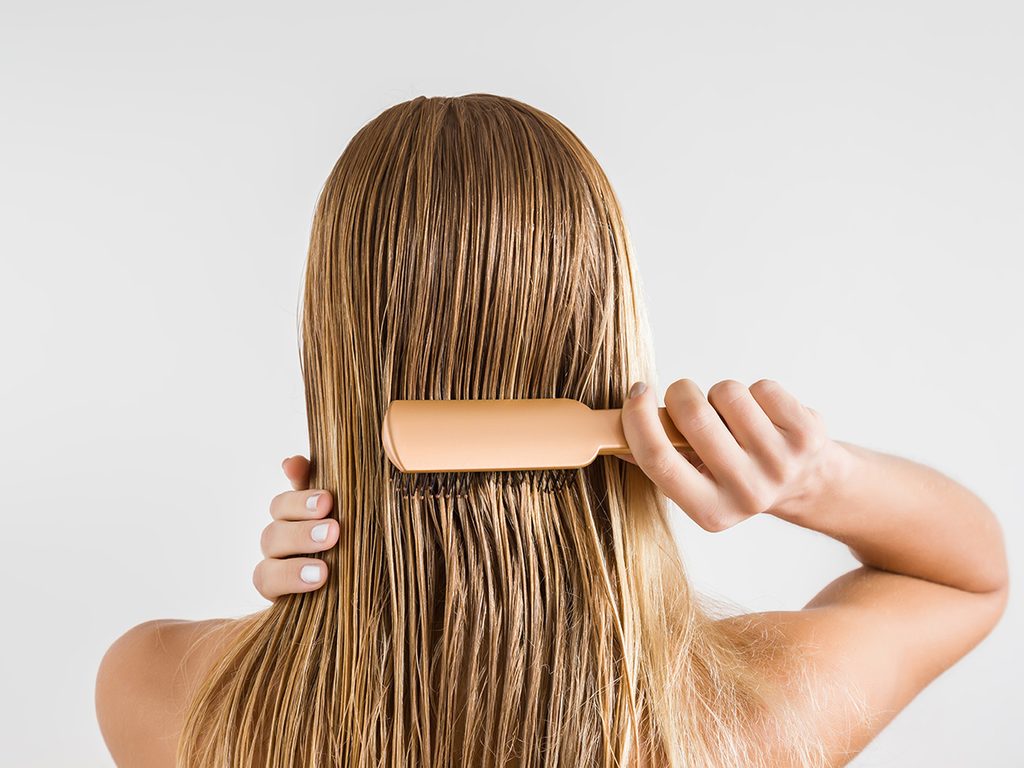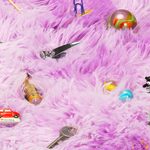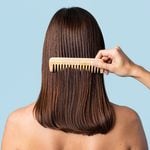5 Reasons to Stop Washing Your Hair

One writer finds out why the "no 'poo" movement is gaining momentum. Plus, here's how you can ditch the shampoo for healthy, lustrous locks.
I’m an active gal. When I run or do yoga, my thin little bob gets sweaty, so I’m tempted to wash it every day. But I also swim laps, so washing plus chlorine dries my hair to a crispy mess.
The rising ‘no ‘poo’ movement caught my attention. Followers are ditching their shampoo bottle and using brushes and talc. They profess to having gorgeous locks and say hair in its natural state is healthier, better for the environment and looks fabulous with little work.
(Sign up for our Must Reads newsletter for more feel-good tips, beauty product recommendations and delicious recipes!)
I gave the shampoo-free life a try for a little while. Here are five reasons why you might want to ditch the ‘poo, too:
1. Avoid chemicals
Many of the unpronounceable ingredients on shampoo and conditioner labels come with safety concerns. Possible carcinogen and hormone disrupter diethyl phthalate (DEP) helps hair products hold fragrance. Sodium lauryl sulfate (SLS) makes shampoo foam up, but it irritates skin and could be cancer-causing. Parabens work as a preservative, but they’ve been found in breast cancer tumour tissue, says Rick Smith, executive director of Environmental Defence, and coauthor of Slow Death By Rubber Duck. He suggests washing less often or buying products without these ingredients.
2. Use less water
When you’re not washing your hair every day, you reduce your water consumption, which has environmental benefits. (I’ve found, on non-hair-wash days, a quick splash on my body from the tub faucet is all I need.) But also, reducing how much water your hair is exposed to is good for your locks, especially if you colour as the heat and minerals in your shower water strips colour from your strands. “Water alone can be responsible for 80 percent of colour fade,” says Jeni Thomas, principal scientist for P&G Beauty and Grooming in Cincinnati, OH. She recommends that when you do wash your hair, you expose it to as little water as possible.
(Related: Is Hard Water Ruining My Hair?)
3. Save time
Washing, conditioning and styling takes up a heck of a lot of time in the morning. When you wash your hair less often, you gain time to do other healthful things like taking a morning jog or sleeping in. Having some tricks to extend the time between hair washings lets you be more flexible. For instance, hold off on washing before a midday swim (a favourite trick of mine) or take a full shower after an evening tennis game.
4. Get healthier hair
The folks who don’t wash their hair for months on end claim that when they stop washing, their hair eventually produces less scalp oil, which is called sebum. The result: hair that’s shiny, moist and healthy ‘ never greasy. Thomas agrees that sebum is good for your hair: “Scalp oils have a naturally protective quality — they’re nature’s conditioner.”
However, Thomas says there are no published studies showing sebum works on a supply and demand model. “What you do when you remove oils is more of an external effect,” she says. “I don’t know of any proof that this can impact the underlying biological process.”
5. Get to know your locks
In the end, I was able to go just two weeks without washing my hair. But brushing and talc was enough to keep grease at bay for about a week at a time. After a summer of infrequent washing, I improved my scalp health (all that brushing removed traces of dandruff), but I mainly learned a whole lot about my hair and let go of my own rigid rules about when it needed to be washed. I found my locks had more body when dirty than clean, and I could easily go three days without washing. But as a regular lap swimmer with thin hair, I also found that shampoo was something I did need, at least a few times a week.
How you can stretch the time between washes
- When you do wash, Toronto hairstylist Harry Josh says to really clean your scalp to rid it of oils.
- Brush your hair nightly with a boar bristle brush. This redistributes the sebum in your hair, moving it from your oily scalp down to the dry ends.
- Use dry shampoo on bangs to tame oil. Find a coloured talc so you don’t get a funny white residue at your roots.
- When things get nasty, “wash” your hair with a baking soda and water paste and rinse it out with diluted vinegar.
Next: Can Some Hair Products Actually Give You a Fuller Mane?




